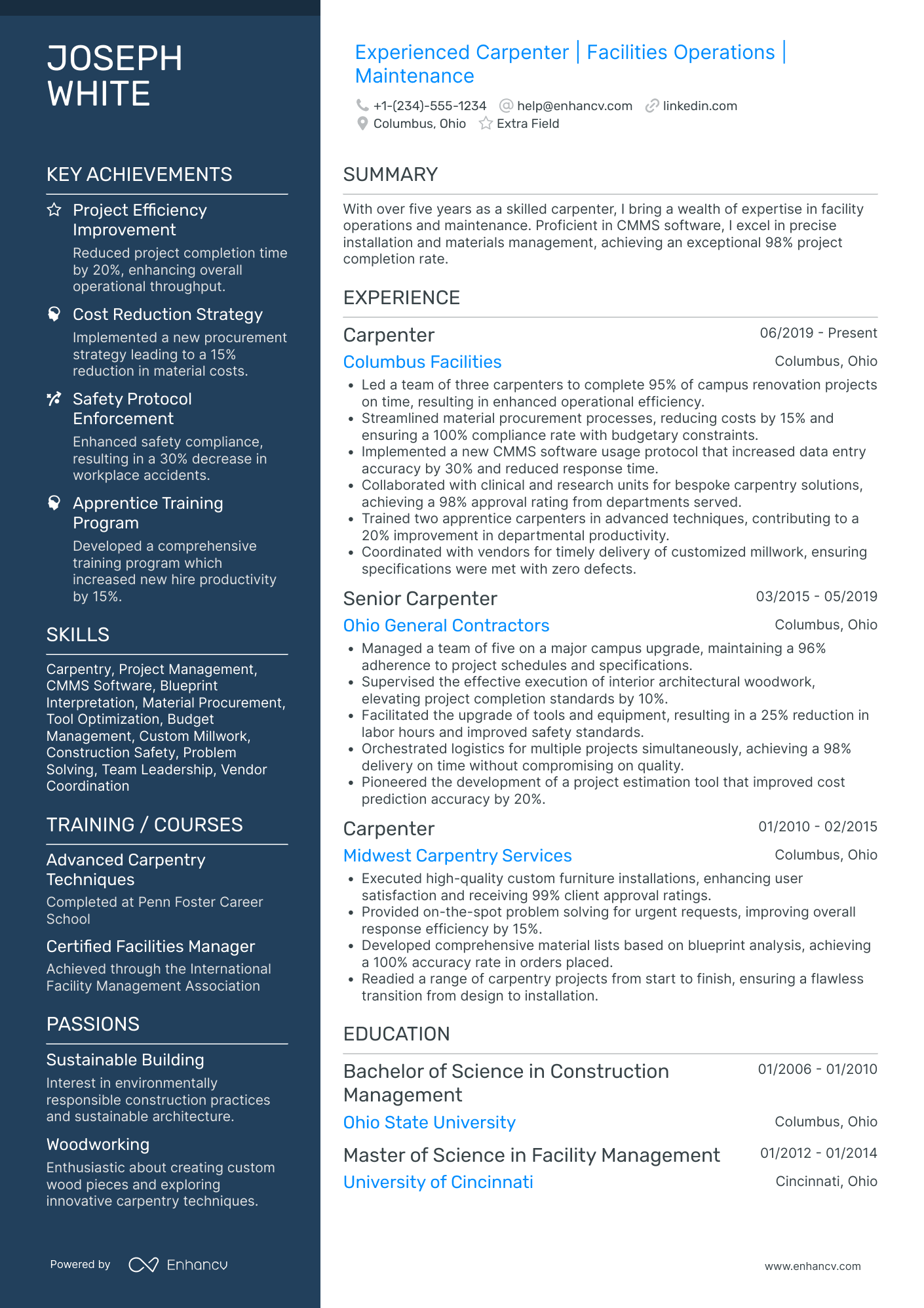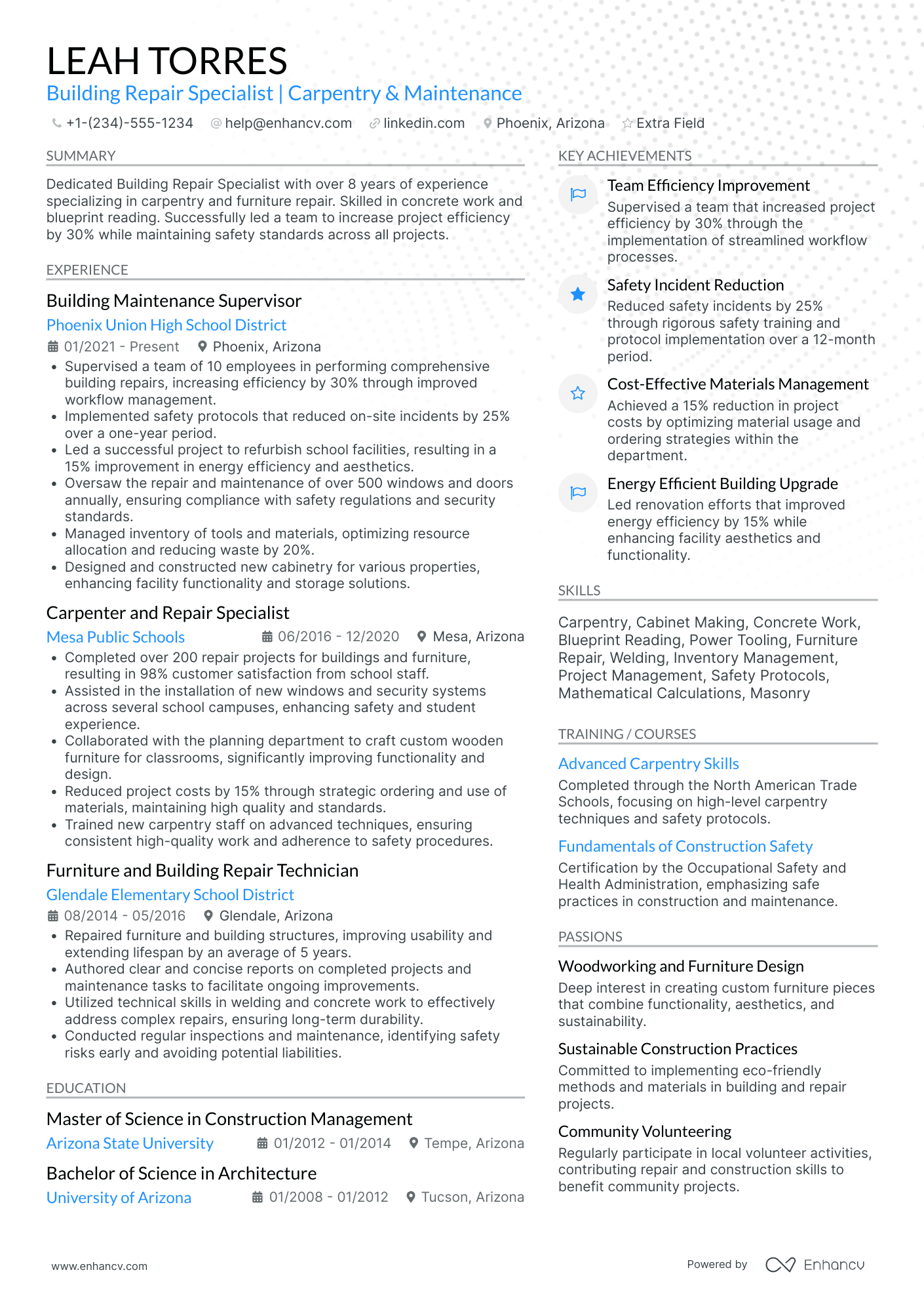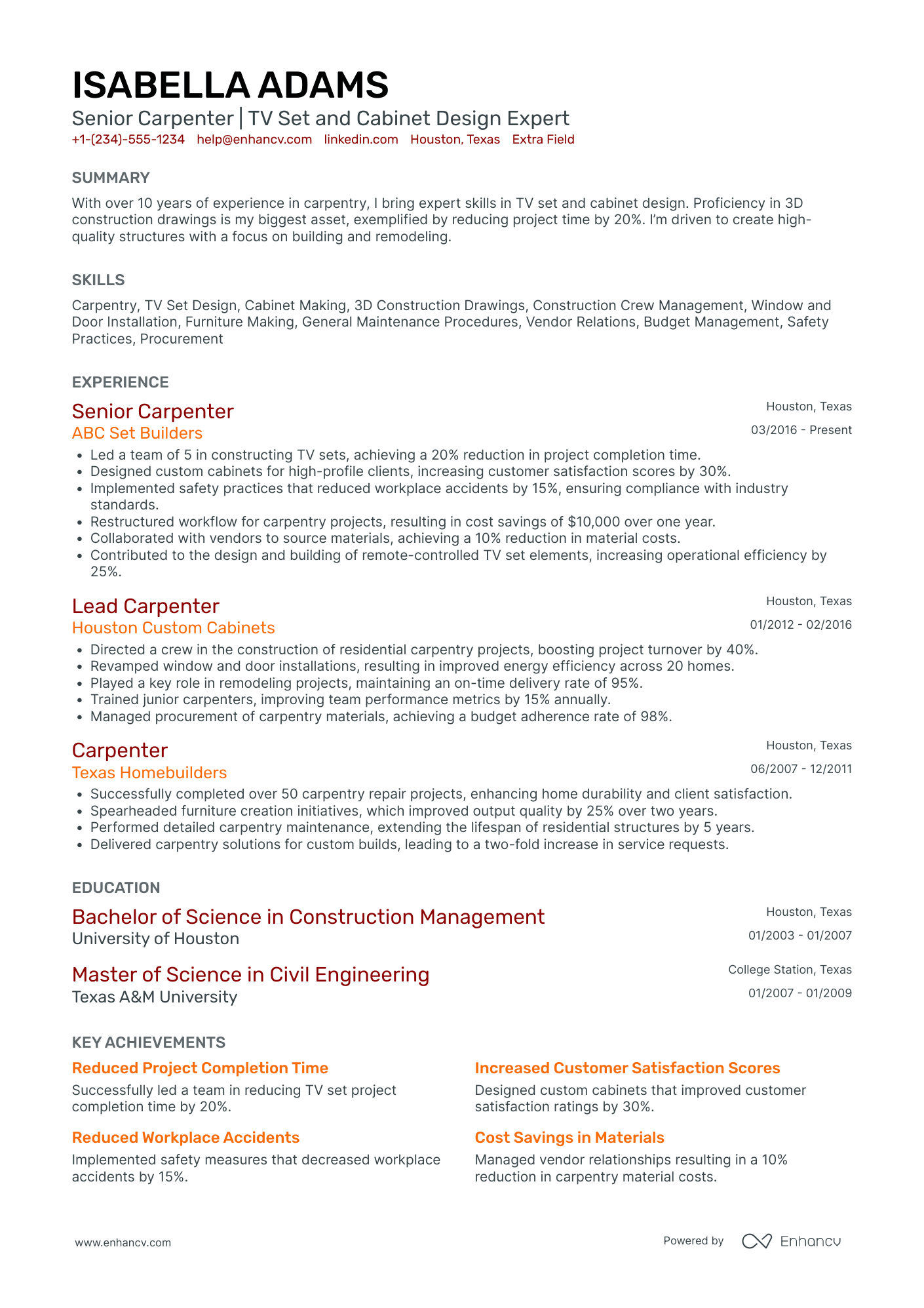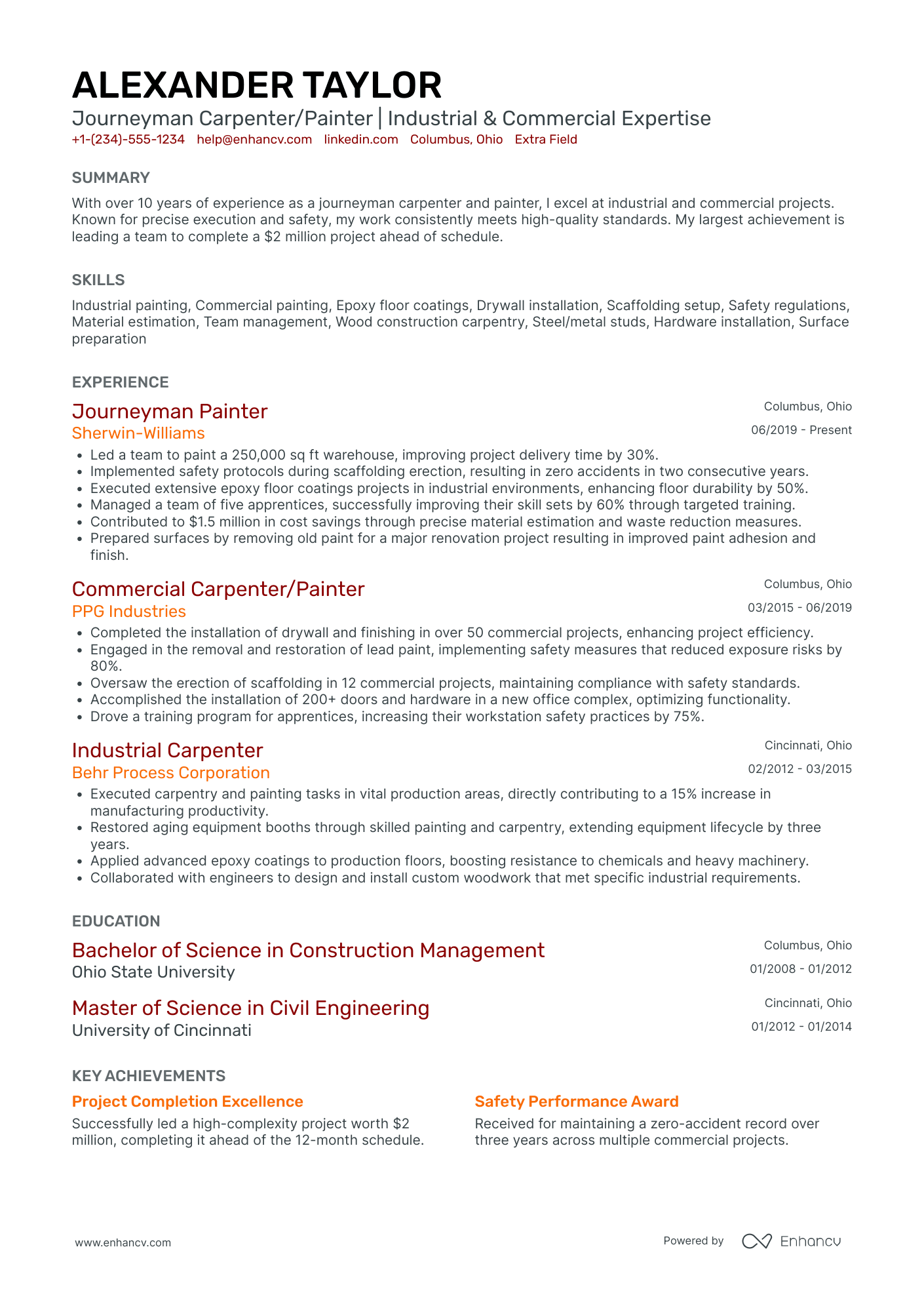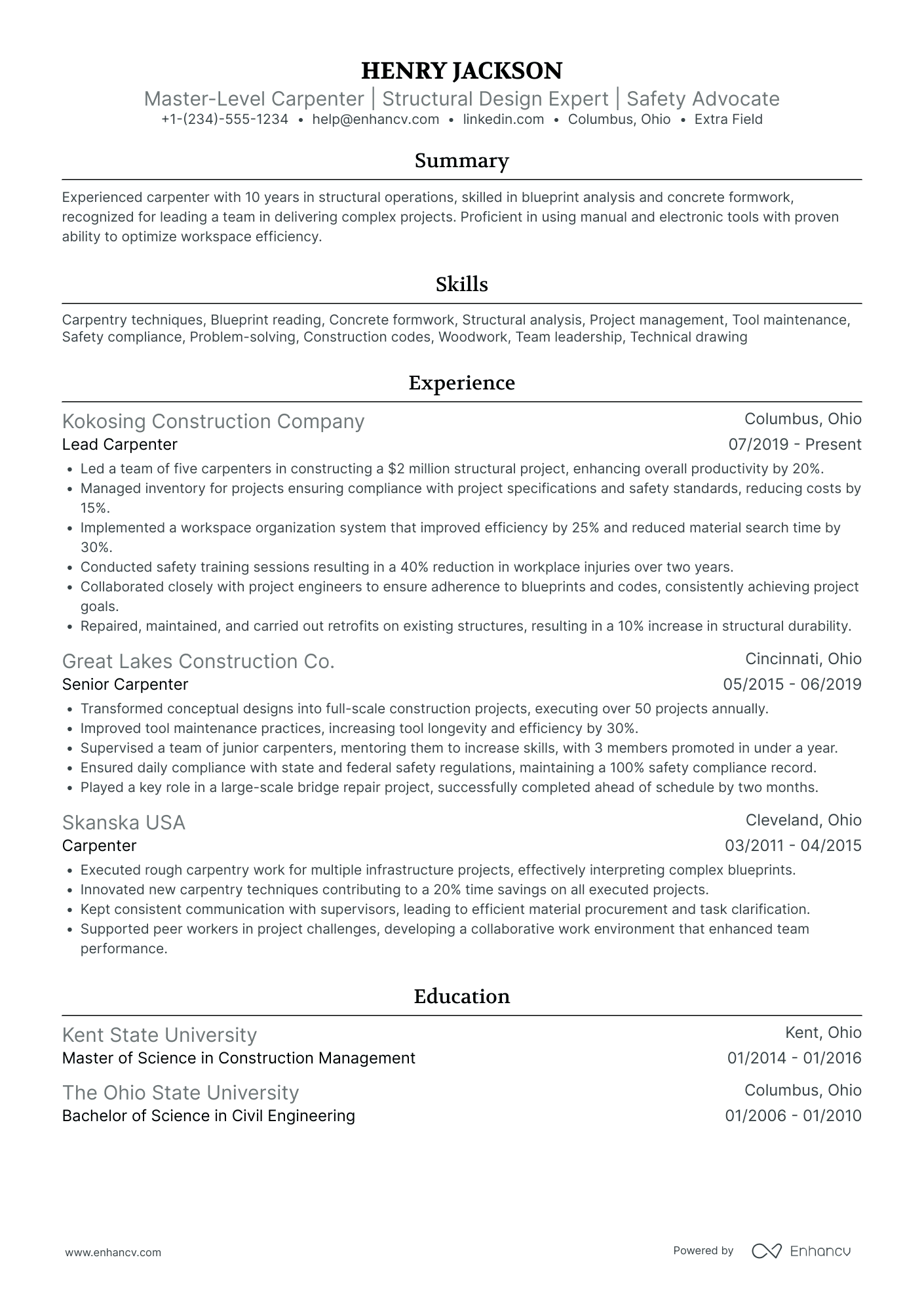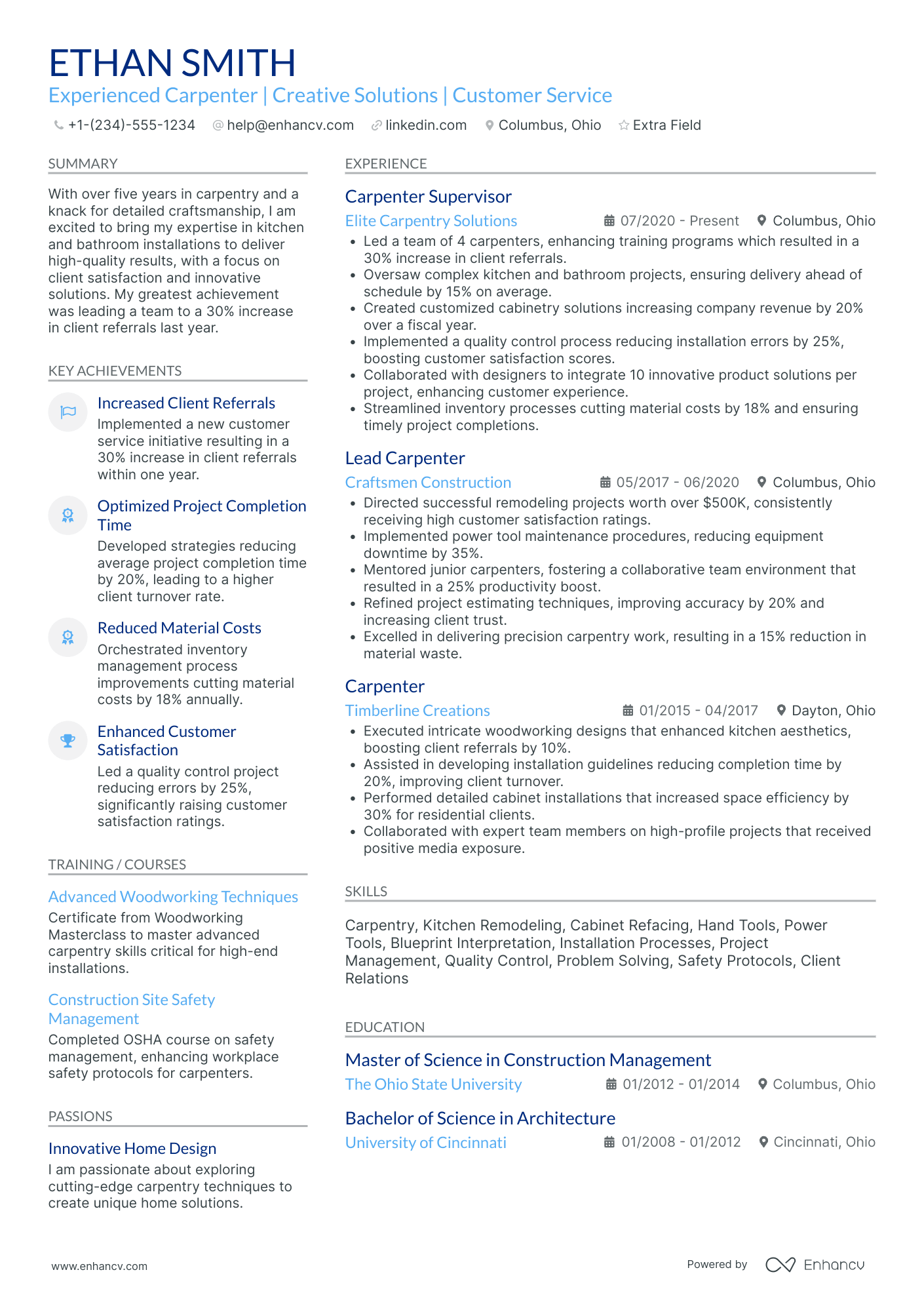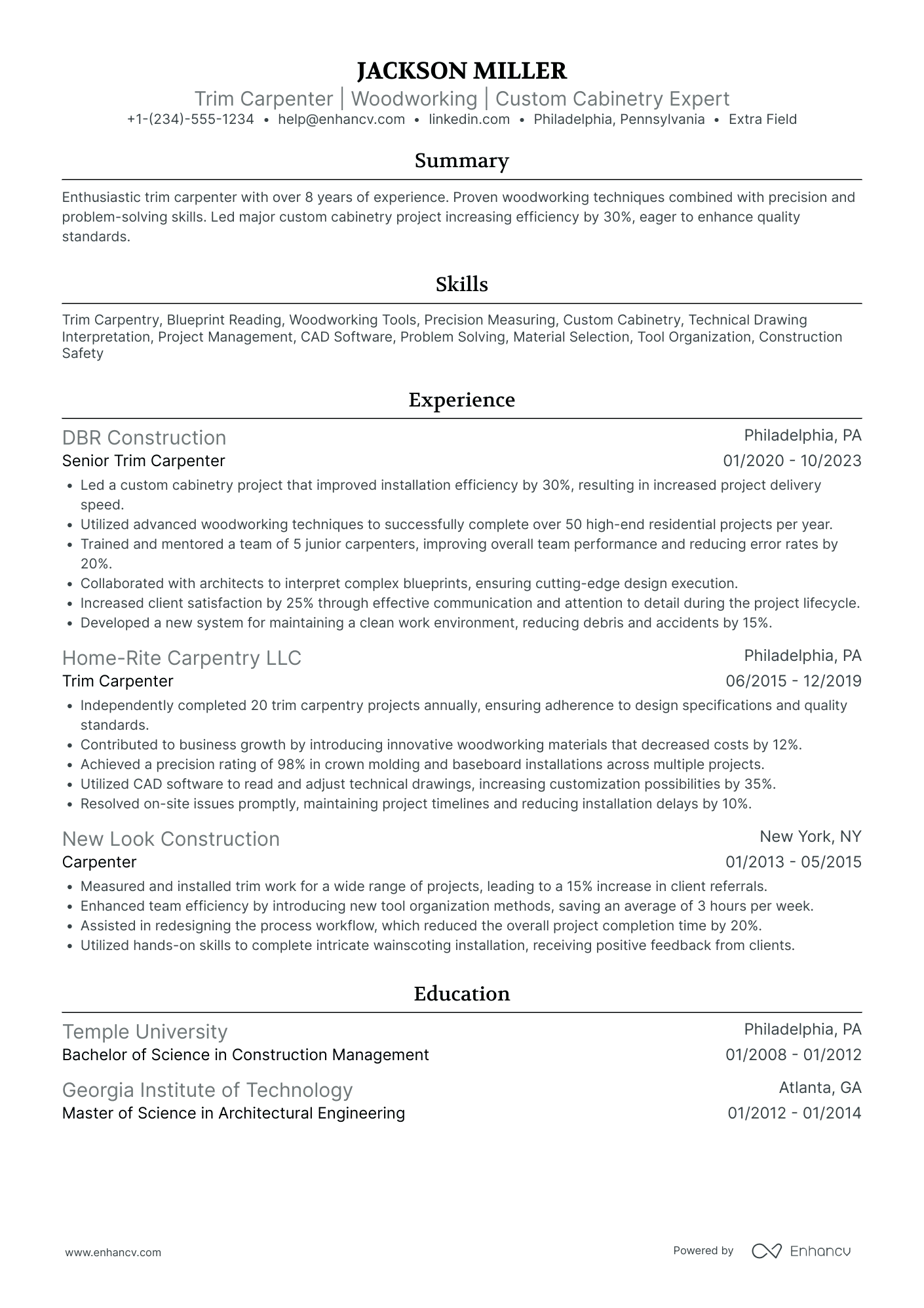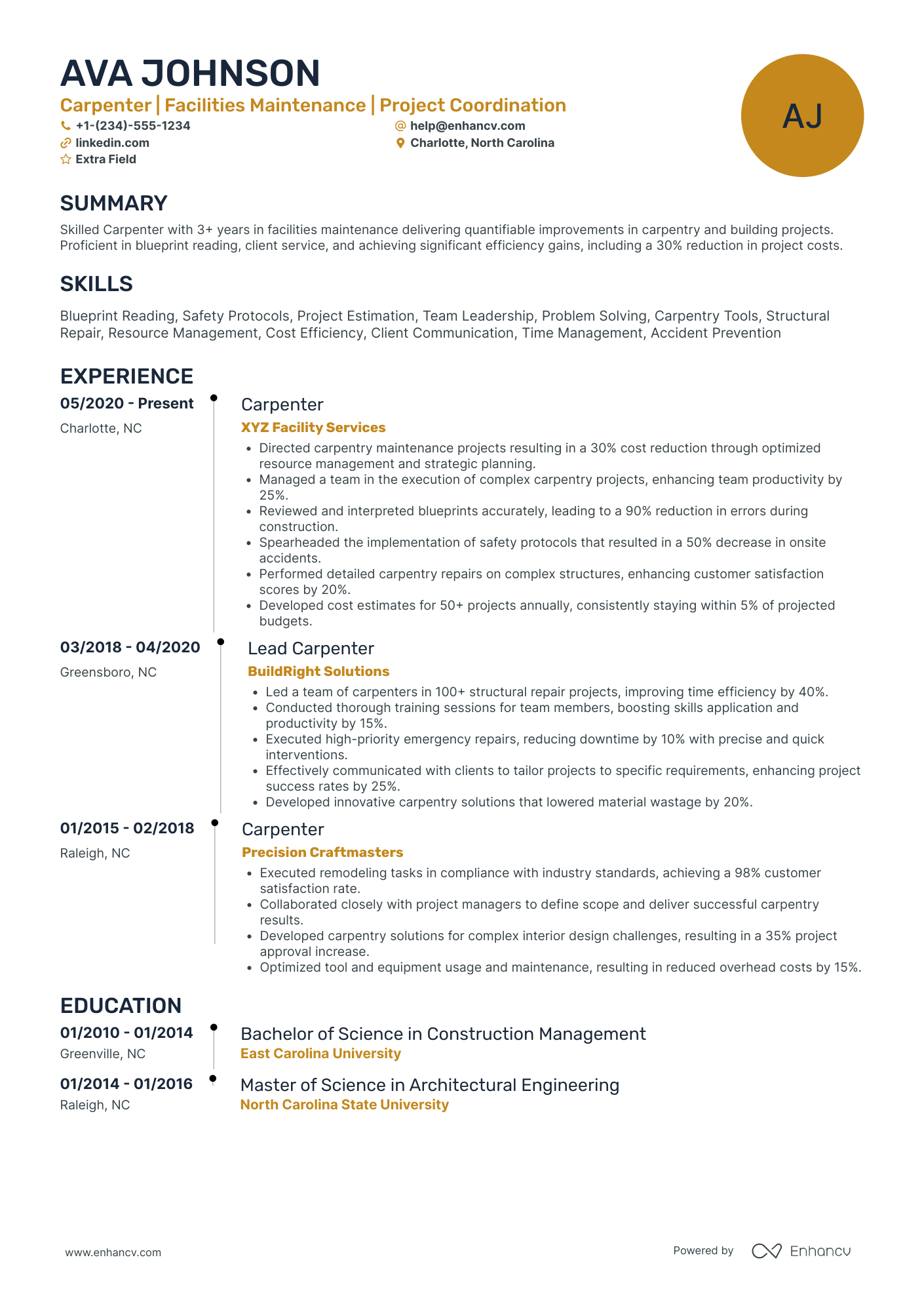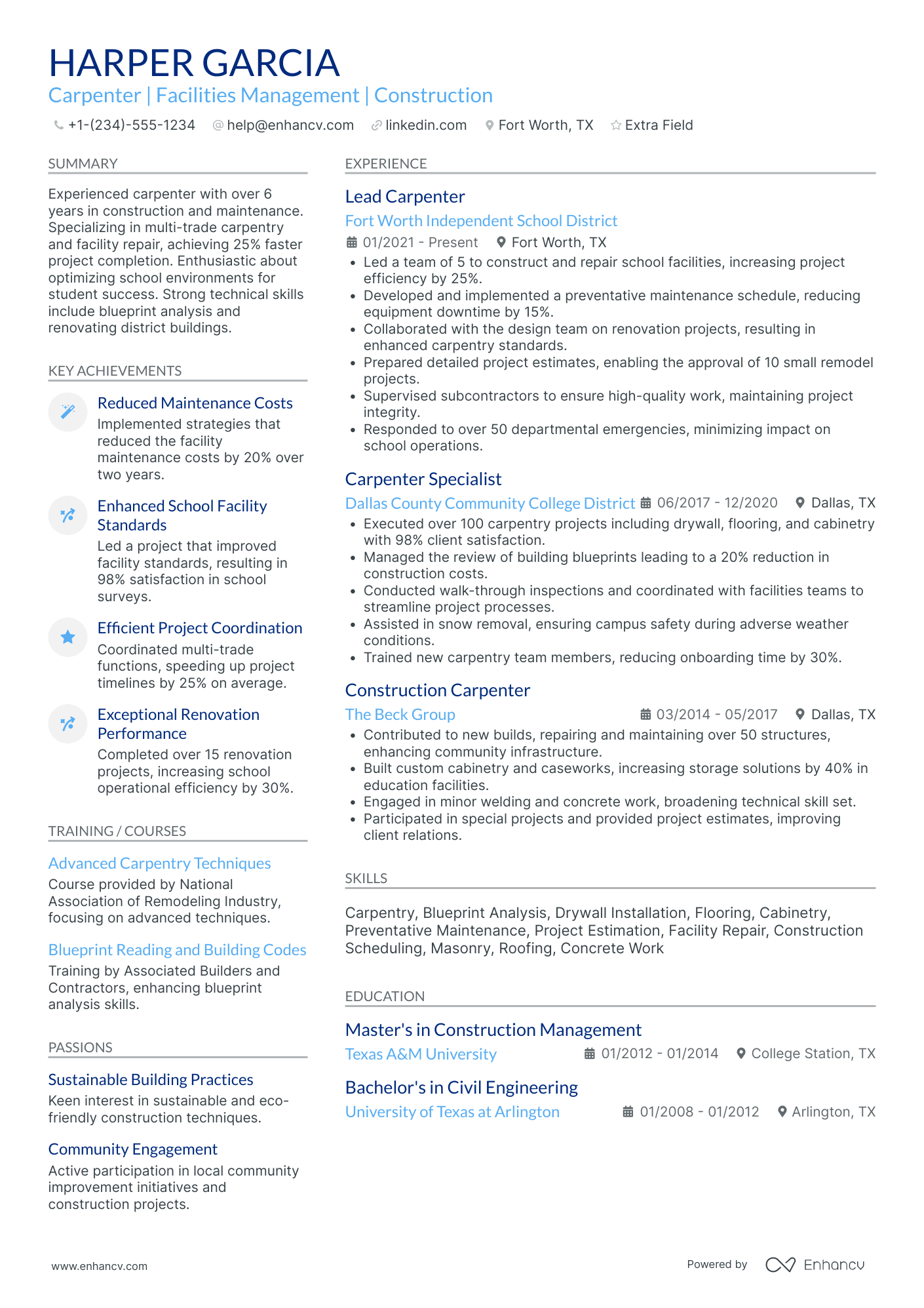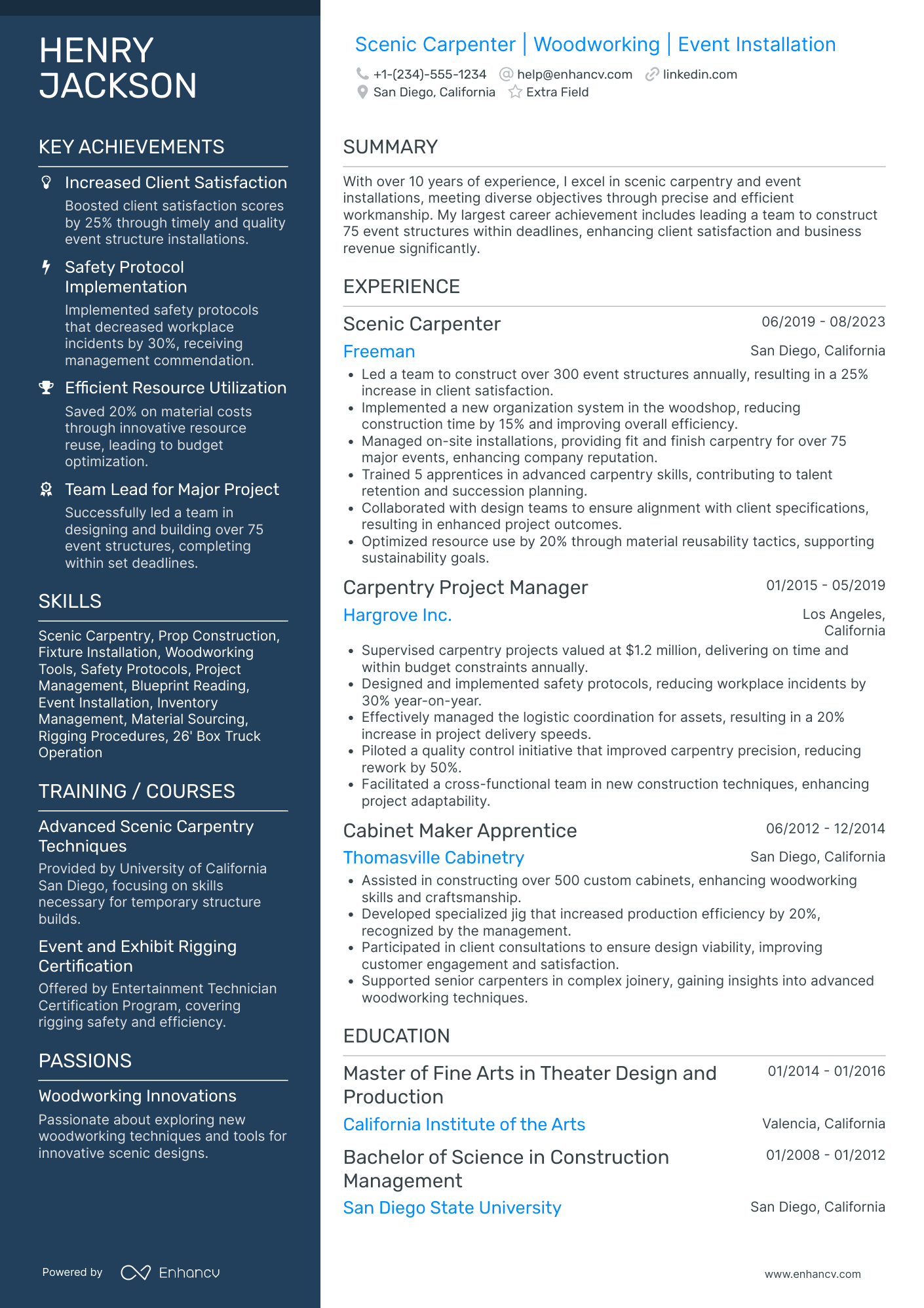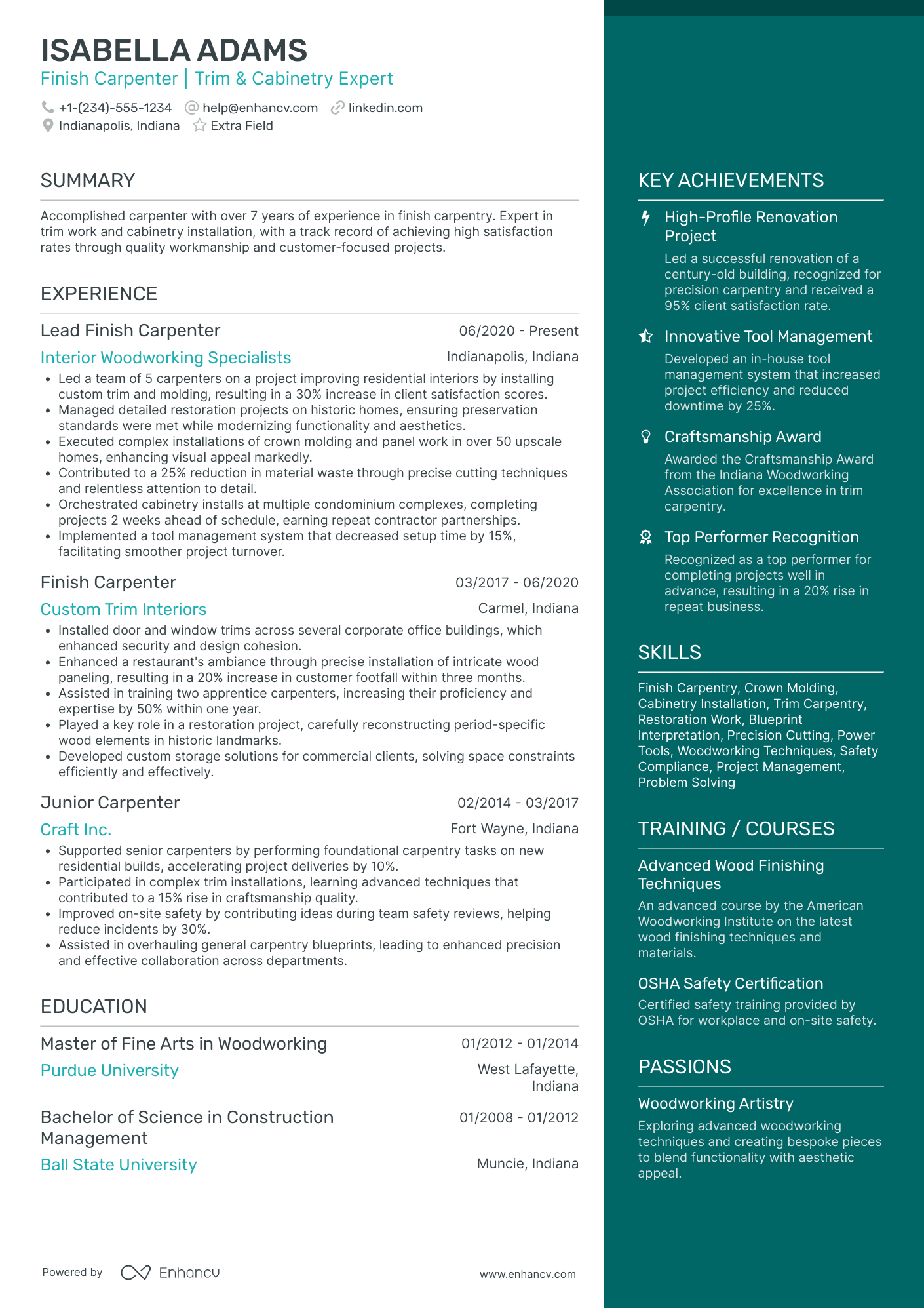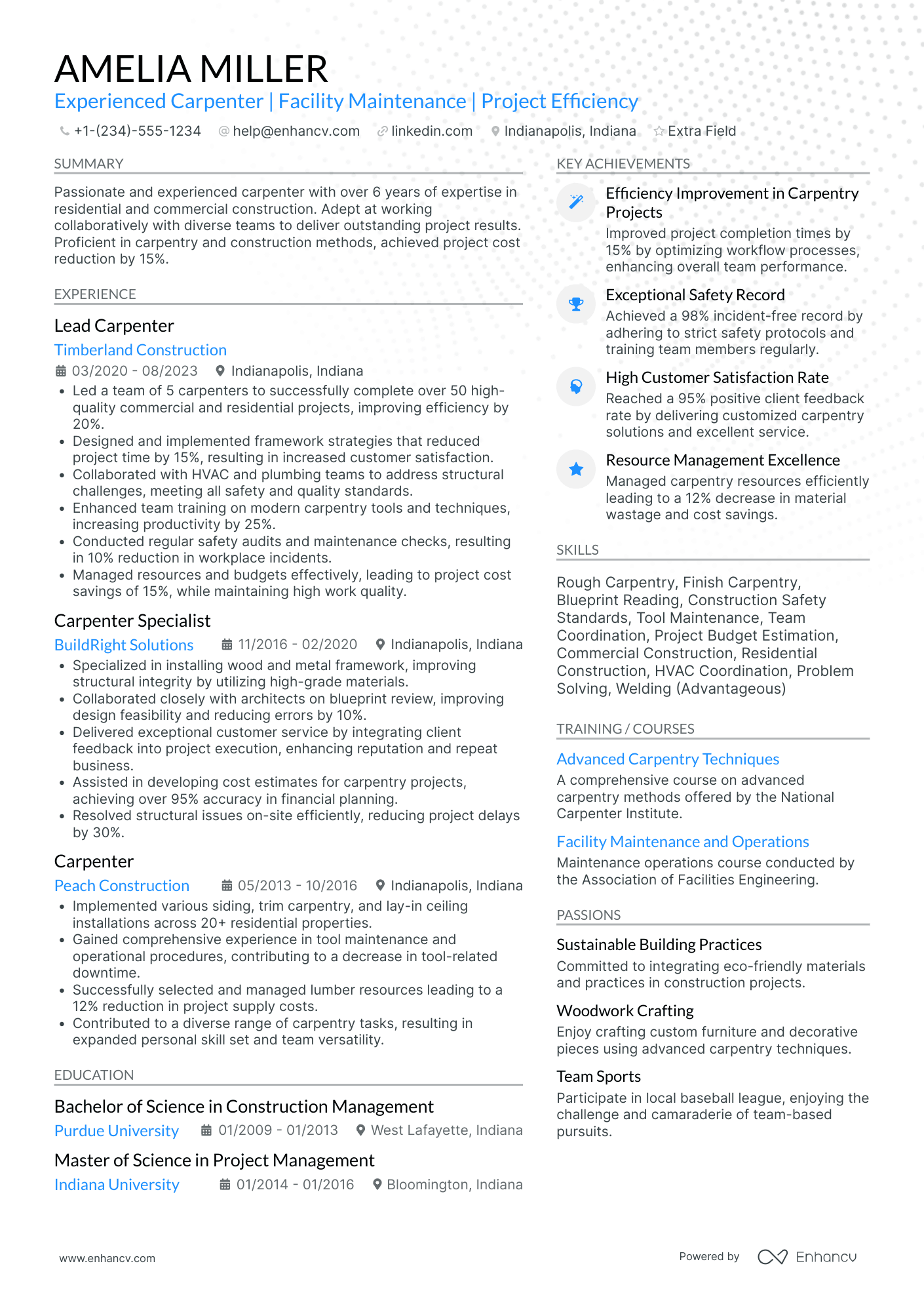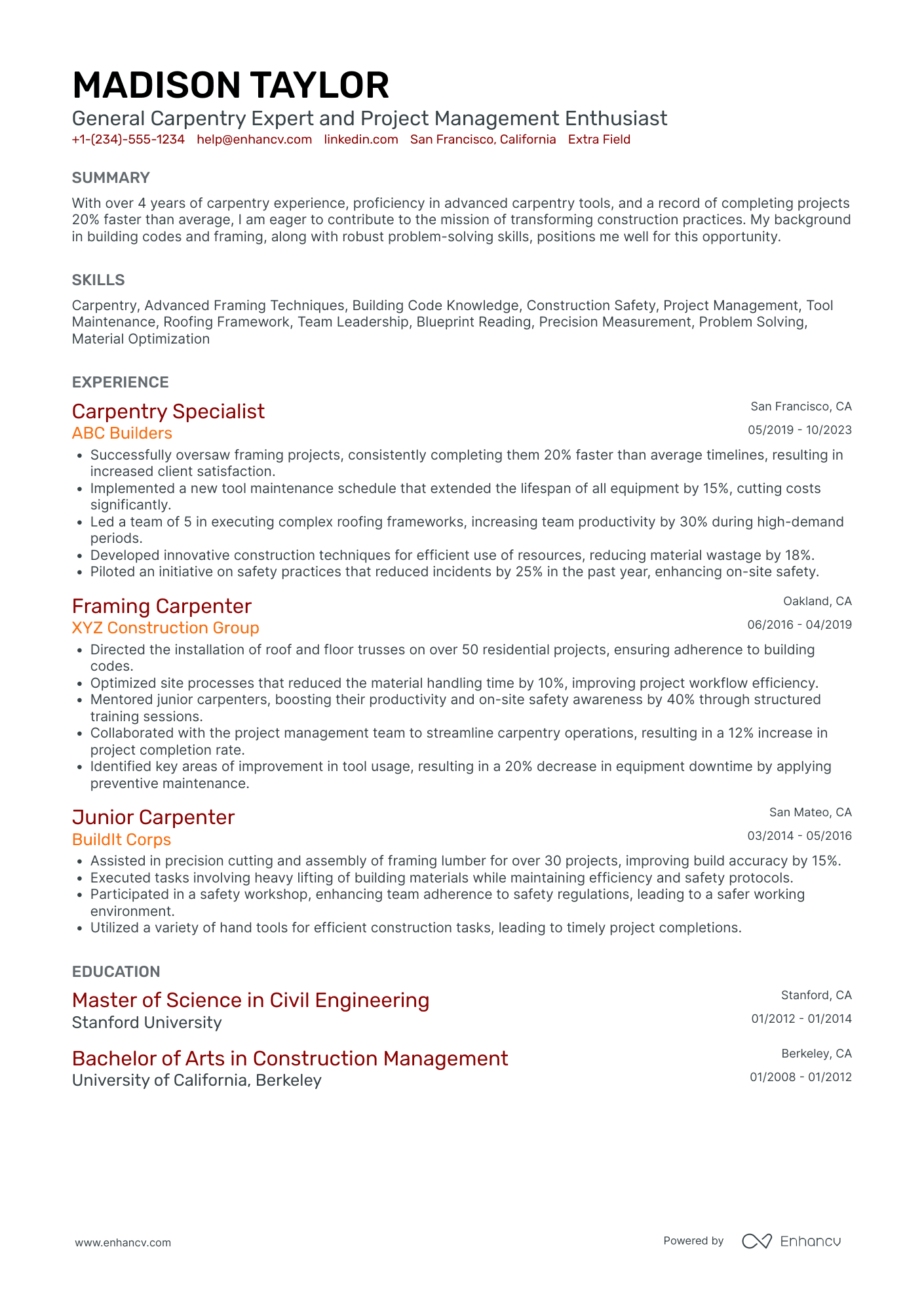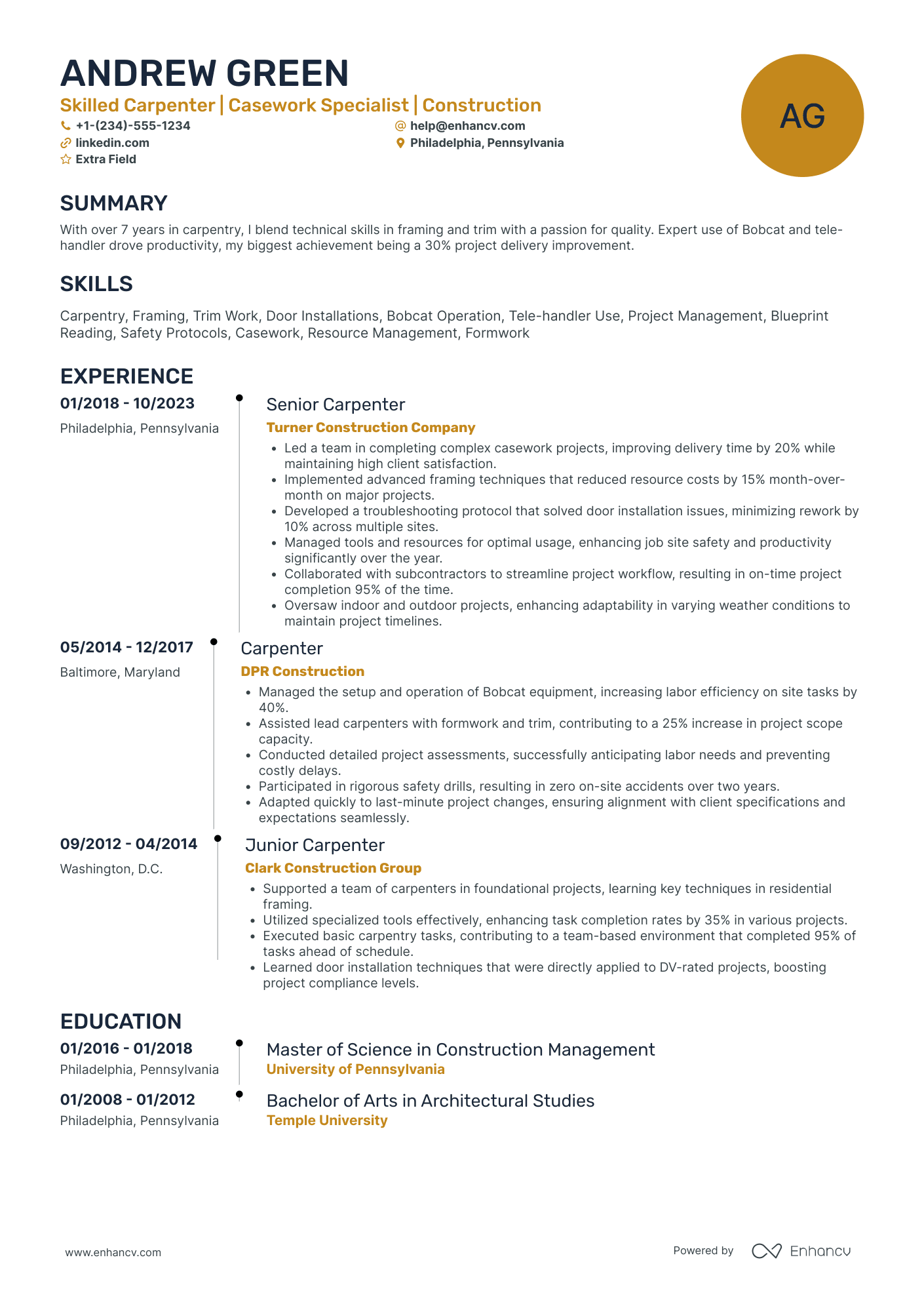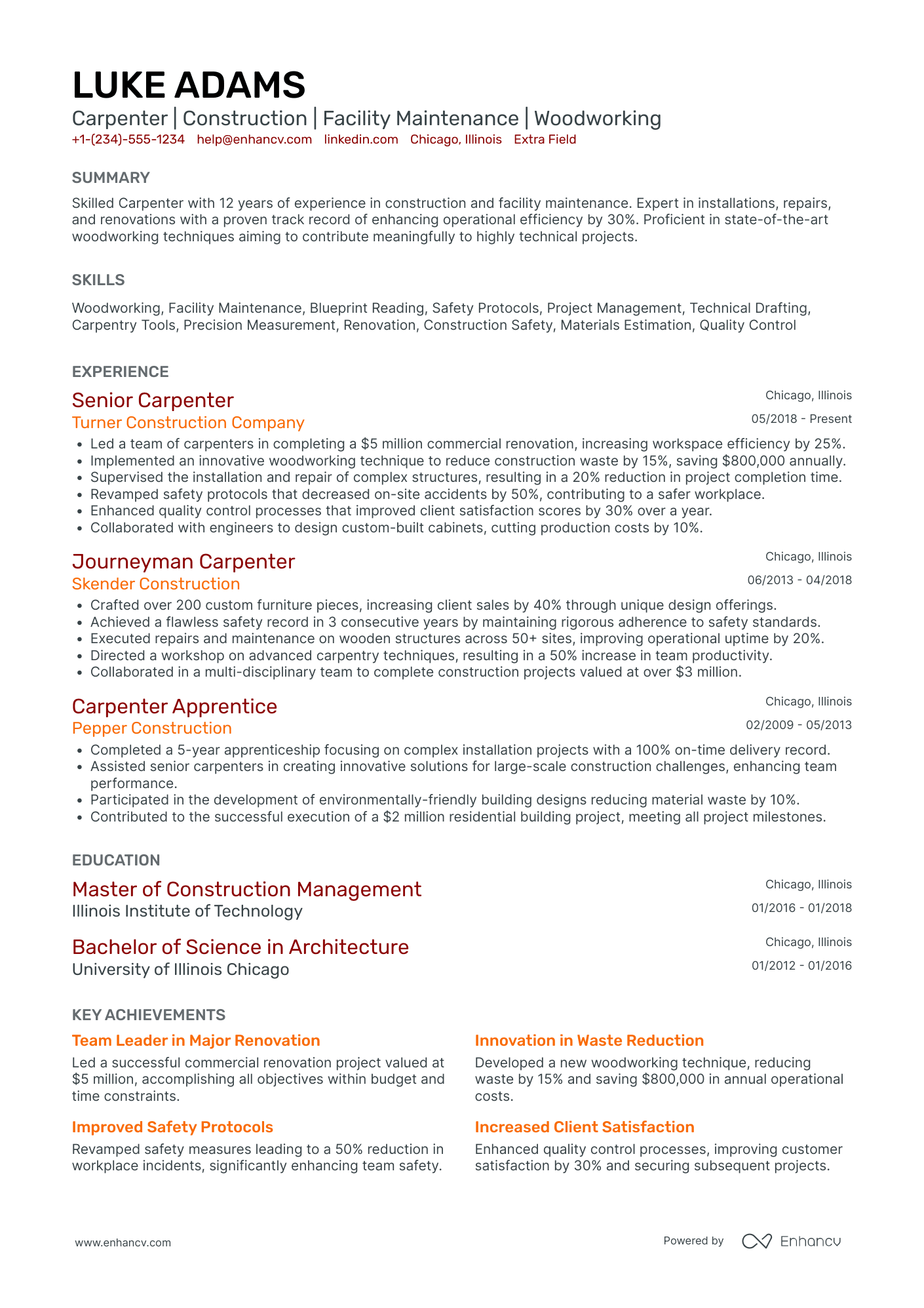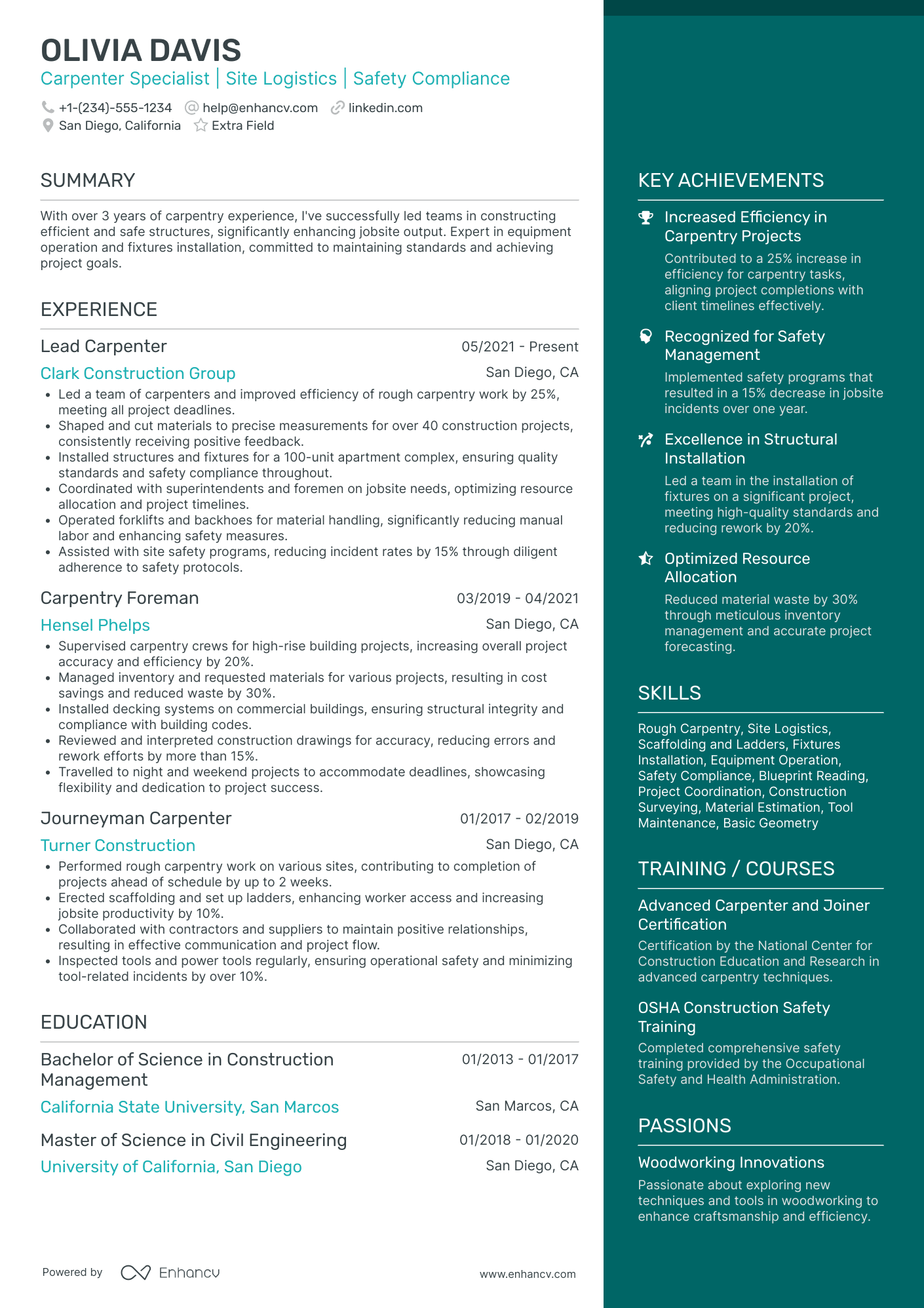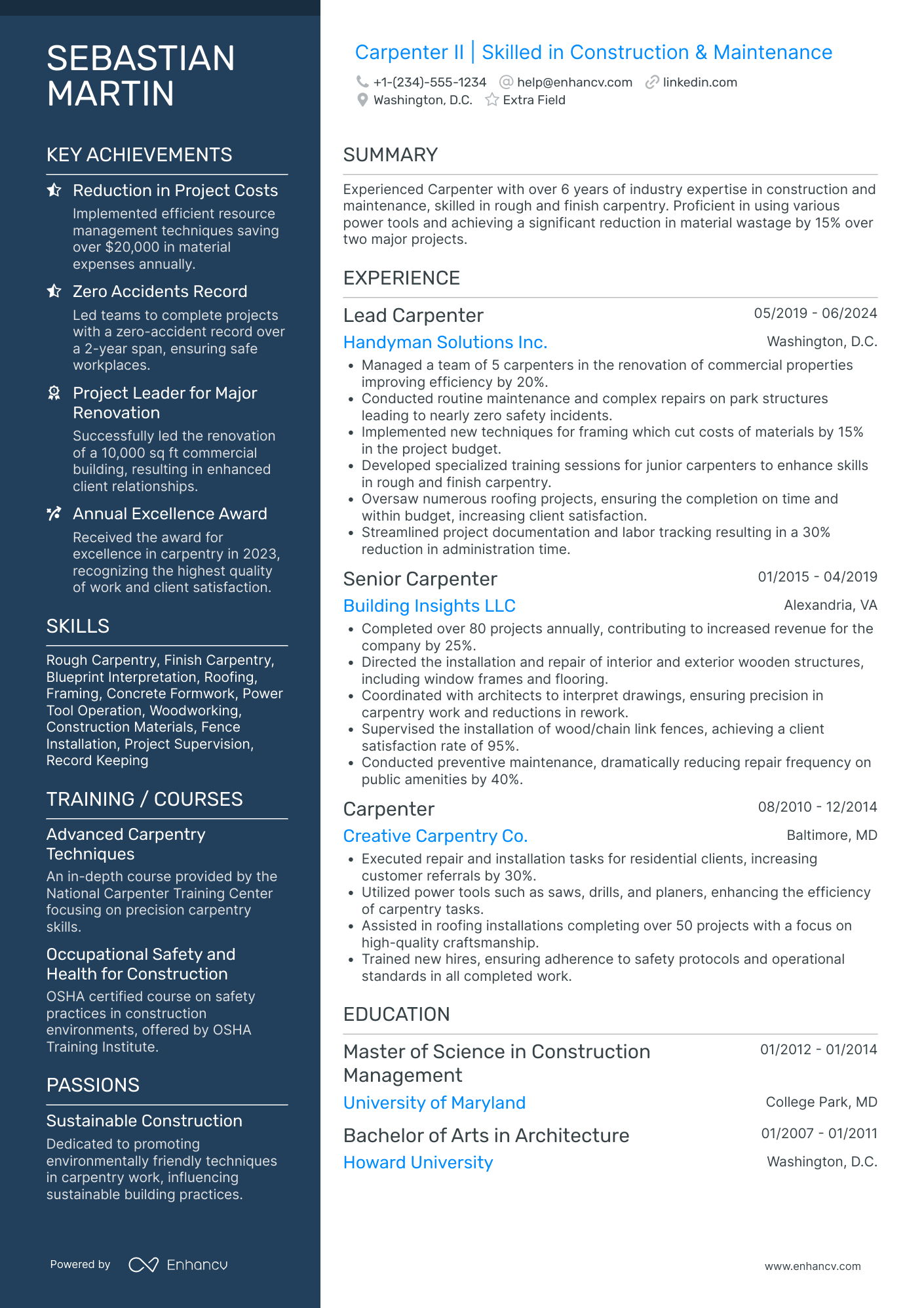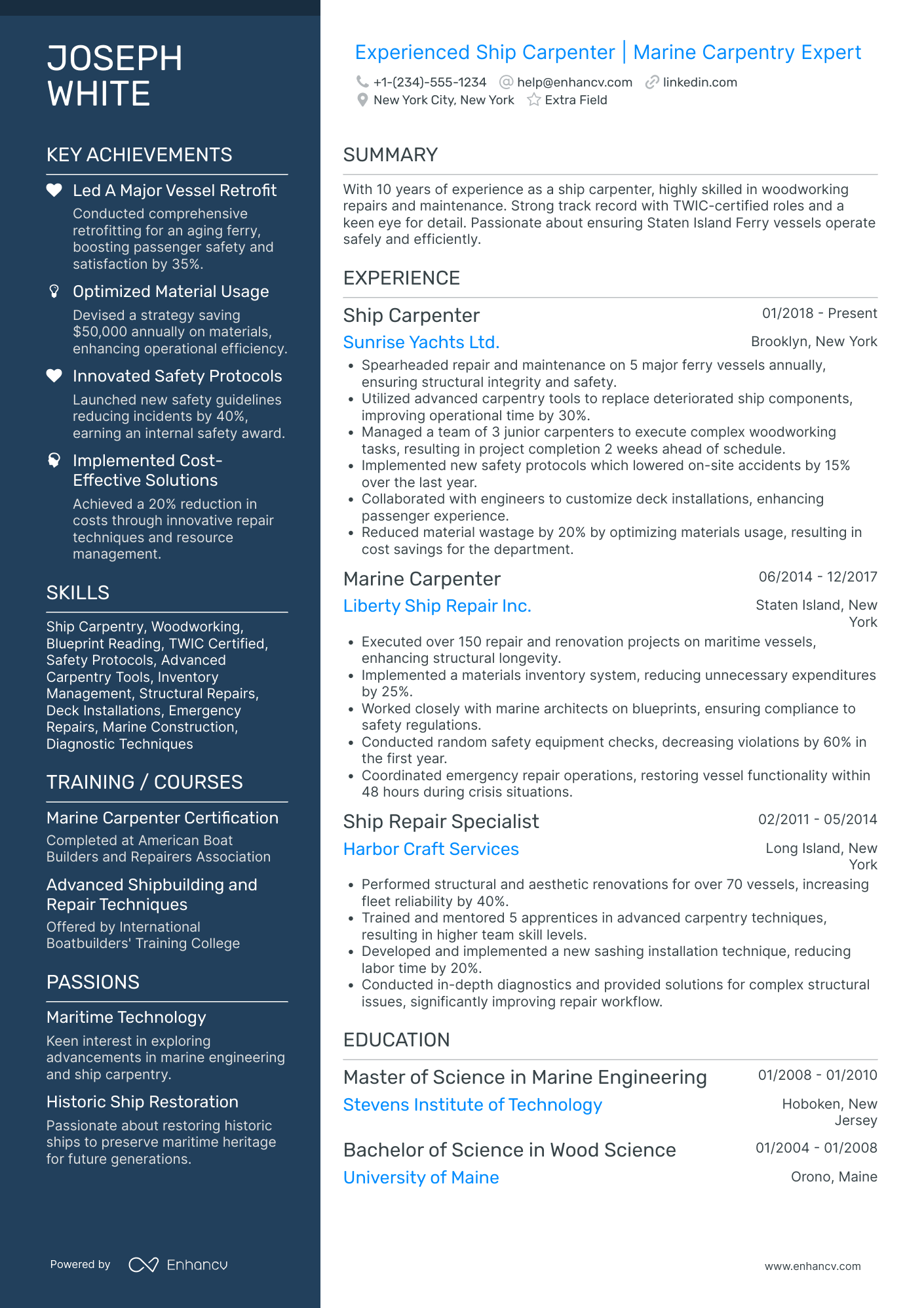As a carpenter, articulating the depth of your hands-on skills and diverse project portfolio on a resume can be a complex challenge. Our guide is tailored to help you effectively showcase your craftsmanship and professional journey, ensuring your resume stands out to potential employers.
- Carpenter resumes that are tailored to the role are more likely to catch recruiters' attention.
- Most sought-out carpenter skills that should make your resume.
- Styling the layout of your professional resume: take a page from carpenter resume examples.
How to write about your carpenter achievements in various resume sections (e.g. summary, experience, and education).
- Field Service Manager Resume Example
- Machinist Resume Example
- Cnc Machinist Resume Example
- Welder Resume Example
- Vendor Manager Resume Example
- Inventory Resume Example
- Logistics Coordinator Resume Example
- Factory Manager Resume Example
- Material Handler Resume Example
- Manufacturing Technician Resume Example
Optimize your carpenter resume format to pass the recruiters' assessment
You may be wondering just how much time you need to spend on designing your carpenter resume.
What recruiters are looking for is systematised content that is clear and coherent. Thus, your carpenter resume needs to answer requirements and why you're the best candidate for the role from the get-go.
Often, a clear layout consists of:
- Sorting your experience in the reverse chronological order - starting with your most recent and relevant roles. This is an excellent choice for more experienced professionals;
- Writing your contact information (e.g. personal phone number and email address) and your portfolio or LinkedIn link in your carpenter resume header. If you're wondering to include a photo or not, always make sure that it's appropriate for the country you're applying in;
- Use the basic, most important carpenter resume sections - your experience, education, summary, etc. Use your resume's real estate wisely to tell a compelling, professional story and match job description's keywords;
- Don't go overboard with the length of your resume. One page is absolutely fine if you happen to have under a decade of relevant experience.
Are you still wondering if you should submit your carpenter resume in PDF or Word format ? The PDF has a few more advantages, as it doesn't change the format and the text can't be altered upon application.
Format matters most when your carpenter resume is assessed by the Applicant Tracker System (or the ATS).
The ATS parses resumes, looking for specific keywords, skills or experience that match the job description.
P.S. We recently did a study on how the ATS works and were able to demystify three of the biggest misconceptions about how it assesses candidate resumes.
To pass the ATS evaluation, select any of the serif or sans-serif fonts. Popular choices that would help your carpenter resume stand out include Raleway, Exo 2, Montserrat, etc.
Most traditionalists go for Arial or Times New Roman, but it's often the case that many candidates choose these fonts, and you'd thus lose points on the uniqueness front.
Consider the local standards – Canadian resumes, for example, may have a different format.
Upload & Check Your Resume
Drop your resume here or choose a file. PDF & DOCX only. Max 2MB file size.
PRO TIP
List your educational qualifications and certifications in reverse chronological order.
Traditional sections, appreciated by recruiters, for your carpenter resume:
- Clear and concise header with relevant links and contact details
- Summary or objective with precise snapshot of our career highlights and why you're a suitable candidate for the carpenter role
- Experience that goes into the nuts and bolts of your professional qualifications and success
- Skills section(-s) for more in-depth talent-alignment between job keywords and your own profile
- Education and certifications sections to further show your commitment for growth in the specific niche
What recruiters want to see on your resume:
- Demonstrated carpentry skill set, including technical knowledge of building materials and construction techniques
- Experience with a variety of hand tools, power tools, and machinery specific to carpentry work
- Examples of completed projects or structures showcasing craftsmanship and attention to detail
- Understanding of current building codes and safety standards within the carpentry industry
- Ability to read and interpret blueprints and architectural drawings
Quick formula for writing your carpenter resume experience section
Have you ever wondered why recruiters care about your carpenter expertise?
For starters, your past roles show that you've obtained the relevant on-the job training and expertise that'd be useful for the role.
What is more, the resume work experience section isn't just your work history , but:
- shows what you're capable of achieving based on your past success;
- proves your skills with (oftentimes, tangible) achievements;
- highlights the unique value of what it's like to work with you.
To ensure your resume work experience section is as effective as possible, follow this formula:
- start each bullet with a powerful, action verb , followed up by your responsibilities, and your workplace success.
The more details you can include - that are relevant to the job and linked with your skill set - the more likely you are to catch recruiters' attention.
Additionally, you can also scan the job advert for key requirements or buzzwords , which you can quantify across your experience section.
Not sure what we mean by this? Take inspiration from the carpenter resume experience sections below:
- Expertly crafted custom cabinetry for over 30 residential clients, notably increasing homeowner satisfaction by 40% according to follow-up surveys.
- Efficiently led and completed the renovation of a 1920s heritage building, meticulously restoring original woodwork while ensuring compliance with historical preservation standards.
- Spearheaded a team that implemented eco-friendly carpentry practices, reducing material waste by 25% and fostering a sustainability-focused culture.
- Played a pivotal role in constructing 50+ custom-designed playhouses for a charitable initiative, directly contributing to a community award for social responsibility.
- Designed and executed a comprehensive workflow optimization, slashing project completion times by 15% without compromising on craftsmanship.
- Enhanced safety standards by implementing a rigorous training program, reducing workplace accidents by 20%.
- Executed complex architectural blueprints to successfully construct four high-end, multi-storied residential buildings each valued at over $2 million.
- Coordinated with a team of 10 subcontractors to deliver projects an average of 10% ahead of schedule, ensuring client satisfaction and repeat business.
- Developed and maintained strong vendor relationships that resulted in a 15% cost reduction in raw materials.
- Leveraged advanced woodworking technology to enhance production efficiency, resulting in a throughput increase of 30% and a 20% reduction in labor costs.
- Introduced a customer feedback loop for bespoke furniture pieces, consistently achieving an NPS score above 70 which led to a 25% uptick in referral business.
- Stewarded the development and implementation of an apprenticeship program that produced 5 full-time carpenters within the first year.
- Collaborated with a team to construct the award-winning ‘Green Haven’ eco-housing project, featuring 20 sustainable homes lauded for progressive environmental design.
- Optimized the inventory management system, effectively cutting down on material overstock by 30% and reducing the incidence of tool misplacement.
- Conducted comprehensive trainings for new hires, enhancing team skills and knowledge in advanced carpentry techniques and safety protocols.
- Consistently delivered detailed finish work for luxury homes, significantly increasing market value by an average of $50,000 to $75,000 per property.
- Managed material procurement for a construction firm, achieving a year-over-year budget savings of 10% while improving material quality.
- Pioneered a modular construction technique that was adopted firm-wide, cutting down on-site construction time by 20%, and enhancing worker efficiency.
- Orchestrated a large-scale commercial remodeling project, which included updating the interiors of a 200-room hotel, completing the project two weeks ahead of schedule.
- Authored and enforced rigorous quality control protocols, elevating the quality of furniture and fittings produced, leading to an increase in customer satisfaction ratings by 30%.
- Negotiated contract agreements with suppliers that improved material turnaround time by 15%, streamlining project timelines and enhancing client satisfaction.
- Engaged in extensive custom structural work for a series of boutique restaurants, each project delivering a unique blend of aesthetic and functional design that bolstered the client's brand identity.
- Implemented a cross-training program that resulted in a flexible workforce able to increase manpower in critical project stages, seamlessly scaling up output by 20%.
- Championed the adoption of digital project tracking tools that cut down administrative time for carpentry teams by 15%, allowing more time to be spent on-site.
The following content includes information from "O*NET OnLine" by the U.S. Department of Labor, Employment and Training Administration (USDOL/ETA). Used under the CC BY 4.0 license. The data represents the top responsibilities present on the task lists for carpenter professionals.
Top Responsibilities for Carpenter:
- Follow established safety rules and regulations and maintain a safe and clean environment.
- Measure and mark cutting lines on materials, using a ruler, pencil, chalk, and marking gauge.
- Assemble and fasten materials to make frameworks or props, using hand tools and wood screws, nails, dowel pins, or glue.
- Study specifications in blueprints, sketches, or building plans to prepare project layout and determine dimensions and materials required.
- Shape or cut materials to specified measurements, using hand tools, machines, or power saws.
- Verify trueness of structure, using plumb bob and level.
- Inspect ceiling or floor tile, wall coverings, siding, glass, or woodwork to detect broken or damaged structures.
- Erect scaffolding or ladders for assembling structures above ground level.
- Install structures or fixtures, such as windows, frames, floorings, trim, or hardware, using carpenters' hand or power tools.
- Maintain records, document actions, and present written progress reports.
Quantifying impact on your resume
- Include the exact number of years you have spent working as a carpenter to demonstrate the breadth of your experience.
- Specify the types of projects completed and quantify them, such as "constructed over 50 custom cabinets," to show your productivity and expertise.
- List the number of clients served or repeat clients to indicate customer satisfaction and reliability.
- State the size of the teams you have led or worked with, to highlight your ability to collaborate effectively with others.
- Describe the scale of the projects you have worked on in square footage or dollar value to provide context for your experience.
- Mention any awards or recognitions you have received, quantifying how many and the level of each to establish credibility.
- Quantify any reduction in waste or costs you were able to achieve in your projects to demonstrate efficiency and cost-effectiveness.
- Detail the percentage of projects completed on or ahead of schedule to emphasize your time management skills and reliability.
Action verbs for your carpenter resume
Writing your carpenter experience section without any real-world experience
Professionals, lacking experience, here's how to kick-start your carpenter career:
- Substitute experience with relevant knowledge and skills, vital for the carpenter role
- Highlight any relevant certifications and education - to showcase that you have the relevant technical training for the job
- Definitely include a professional portfolio of your work so far that could include university projects or ones you've done in your free time
- Have a big focus on your transferable skills to answer what further value you'd bring about as a candidate for the carpenter job
- Include an objective to highlight how you see your professional growth, as part of the company
Recommended reads:
PRO TIP
List all your relevant higher education degrees within your resume in reverse chronological order (starting with the latest). There are cases when your PhD in a particular field could help you stand apart from other candidates.
In-demand hard skills and soft skills for your carpenter resume
A vital element for any carpenter resume is the presentation of your skill set.
Recruiters always take the time to assess your:
- Technological proficiency or hard skills - which software and technologies can you use and at what level?
- People/personal or soft skills - how apt are you at communicating your ideas across effectively? Are you resilient to change?
The ideal candidate presents the perfect balance of hard skills and soft skills all through the resume, but more particular within a dedicated skills section.
Building your carpenter skills section, you should:
- List up to six skills that answer the requirements and are unique to your expertise.
- Include a soft skill (or two) that defines you as a person and professional - perhaps looking back on feedback you've received from previous managers, etc.
- Create up to two skills sections that are organized based on the types of skills you list (e.g. "technical skills", "soft skills", "carpenter skills", etc.).
- If you happen to have technical certifications that are vital to the industry and really impressive, include their names within your skills section.
At times, it really is frustrating to think back on all the skills you possess and discover the best way to communicate them across.
We understand this challenge - that's why we've prepared two lists (of hard skills and soft skills) to help you build your next resume, quicker and more efficiently:
Top skills for your carpenter resume:
Woodworking tools
Power saws
Hand tools
Blueprint reading
Framing techniques
Joinery methods
Finish carpentry
CAD software
Measuring and leveling tools
Safety equipment
Attention to detail
Problem-solving
Time management
Communication
Teamwork
Adaptability
Creativity
Customer service
Physical stamina
Project management
Next, you will find information on the top technologies for carpenter professonals from "O*NET OnLine" by the U.S. Department of Labor, Employment and Training Administration (USDOL/ETA). Used under the CC BY 4.0 license.
Top technologies for Carpenter’s resume:
- Intuit QuickBooks
- Quicken
- Turtle Creek Software Goldenseal
- VirtualBoss
- Microsoft Word
- Wilhelm Publishing Threshold
PRO TIP
If you happen to have plenty of certificates, select the ones that are most applicable and sought-after across the industry. Organize them by relevance to the role you're applying for.
Including your education and certification on your carpenter resume
The significance of your resume education section is paramount. It can show your diverse talents and experiences that are relevnt to the position.
- Incorporate educational qualifications, mentioning the institution and period.
- If you're on your academic journey, pinpoint your expected completion date.
- Opt for leaving out degrees that don't serve the job's purpose.
- Provide an overview of your educational experiences if it spotlights your milestones.
When recruiting for carpenter roles, candidates with relevant education and certification definitely stand out amongst competitors.
Showcase your academic background in the best way possible by:
- Listing all degrees and certifications that are part of the candidate qualifications in the carpenter advert
- Including any extra certificates, if they make sense to your application
- Not going over the top in details - the certificate name, institution, and dates are enough
- If you're in the process of obtaining a degree or certificate that's relevant to the job, include your expected graduation/certification dates
The education and certification sections help back up your application with years of experience in the industry or niche.
Select some of the most cutting-edge or applicable credentials for your next carpenter application from our list:
The top 5 certifications for your carpenter resume:
- National Center for Construction Education & Research (NCCER) Certification - NCCER
- Certified Journeyman carpenter - CJC
- Occupational Safety and Health Administration (OSHA) 30-Hour Construction Training Certificate - OSHA 30
- Master Certified Green Professional (Master CGP) - Master CGP
- Associate Constructor (AC) - AC
The content below includes information from "O*NET OnLine" by the U.S. Department of Labor, Employment and Training Administration (USDOL/ETA). Used under the CC BY 4.0 license. The data represents the top associations for carpenter professionals.
Top US associations for a Carpenter professional
- Associated Builders and Contractors
- Associated General Contractors of America
- Home Builders Institute
- International Union of Operating Engineers
- National Association of Home Builders
PRO TIP
List your educational qualifications and certifications in reverse chronological order.
Recommended reads:
Professional summary or objective for your carpenter resume
carpenter candidates sometimes get confused between the difference of a resume summary and a resume objective.
Which one should you be using?
Remember that the:
- Resume objective has more to do with your dreams and goals for your career. Within it, you have the opportunity to showcase to recruiters why your application is an important one and, at the same time, help them imagine what your impact on the role, team, and company would be.
- Resume summary should recount key achievements, tailored for the role, through your career. Allowing recruiters to quickly scan and understand the breadth of your carpenter expertise.
The resume objectives are always an excellent choice for candidates starting off their career, while the resume summary is more fitting for experienced candidates.
No matter if you chose a summary or objective, get some extra inspiration from real-world professional carpenter resumes:
Resume summaries for a carpenter job
- With 10+ years of dedicated experience in high-end residential carpentry, I possess a mastery in custom woodwork, cabinetry, and furniture design. My portfolio showcases a track record of precision craftsmanship enhanced by an advanced understanding of architectural blueprints and modern construction techniques, culminating in the successful completion of the multimillion-dollar Lakeview Estate project.
- Dynamic former electrician with 5 years of experience in commercial construction looking to leverage extensive knowledge of electrical systems into the carpentry world. Hands-on experience with power tools and a keen eye for detail will aid in delivering exceptional woodwork, while the experience in project management ensures efficient and quality-driven workmanship.
- An enthusiastic career switcher, formerly a software developer for 8 years, seeking to apply problem-solving skills and passion for practical creativity to the field of carpentry. Eager to contribute a tech-savvy perspective and commitment to quality in constructing innovative and sustainable wooden structures.
- As a seasoned professional with over 15 years of experience in custom furniture making and structural carpentry, I have honed a skill set that includes expert level use of hand tools, CNC machines, and the implementation of green building practices. My career is highlighted by the acclaimed restoration of the historic Brimley Manor, which received an award for Heritage Preservation.
- Seeking to apply my robust enthusiasm for woodworking and dedication to learning new skills in a carpentry apprenticeship. With no prior experience in the field, I bring a fresh perspective, keen attention to detail developed over a successful 4-year career in graphic design, and a deep appreciation for the artisanship involved in carpentry work.
- A recent vocational school graduate with foundational knowledge in carpentry eager to begin a professional journey. Driven by a passion for building and a desire to excel, I aim to contribute my understanding of woodworking tools and techniques to creating quality structures and pieces, while further developing my craft under expert mentorship.
Average salary info by state in the US for carpenter professionals
Local salary info for Carpenter.” Source: My Next Move, National Center for O*NET Development. Accessed 10/15/2024
| State | Average Salary (in USD) |
|---|---|
| US National Average | $56,350 |
| California (CA) | $68,380 |
| Texas (TX) | $47,720 |
| Florida (FL) | $47,530 |
| New York (NY) | $59,830 |
| Pennsylvania (PA) | $57,200 |
| Illinois (IL) | $68,400 |
| Ohio (OH) | $54,520 |
| Georgia (GA) | $48,740 |
| North Carolina (NC) | $46,230 |
| Michigan (MI) | $58,260 |
Additional valuable carpenter resume sections to stand out
When assessing candidate applications, recruiters are often on the lookout for elements that go beyond meeting standard requirements and technical expertise.
This is where extra sections could play a key role in showcasing your unique skill set and personality.
Make sure to include sections dedicated to:
- How you spend your free time, outside of work. The interests resume section also goes to show your personality and transferrable skills; and may also serve to fill in gaps in your experience;
- Most innovative work. The projects resume section brings focus to what you're most proud of within the field;
- How you're able to overcome language barriers. The language resume section is always nice to have, especially if communication would be a big part of your future role;
- Industry-wide recognitions. Remember that the awards resume section should highlight your most noteworthy accolades and prizes.
Key takeaways
We've reached the end of our carpenter resume guide and hope this information has been useful. As a summary of our key points:
- Always assess the job advert for relevant requirements and integrate those buzzwords across various sections of your carpenter resume by presenting tangible metrics of success;
- Quantify your hard skills in your certificates and skills section, while your soft skills in your resume achievements section;
- Ensure you've added additional relevant experience items, such as extracurricular activities and projects you've participated in or led;
- Use both your resume experience and summary to focus on what matters the most to the role: including your technical, character, and cultural fit for the company.
Carpenter resume examples
By Experience
Apprentice Carpenter
Lead Carpenter
By Role
